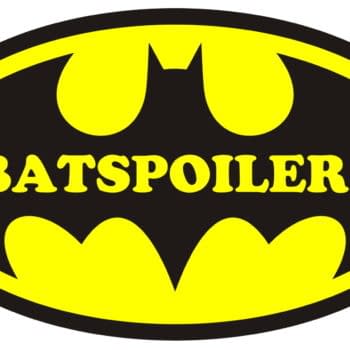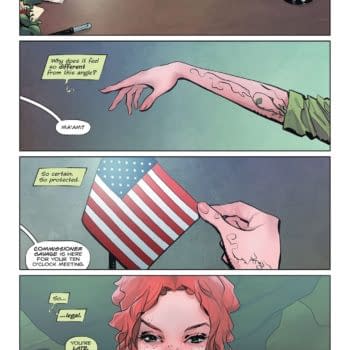Posted in: Comics | Tagged:
7 Reasons Why You Should Self-Publish Your Comic
1. You are in control
By far the best part about self-publishing is that you are in control. How many pages do you want to do? What genre do you want to write in? Do you want to even write in a genre? Who do you want to work with? Want an editor? Want a graphic designer? Want to promote your comic in certain places? Want to champion certain causes?
When it comes to self-publishing you decide exactly what you want to publish. You don't answer to co-writers, editors, publishers, retailers, or even readers. If you have a comic book you want to make, you are completely able to.
It's all up to you.
2. Not being beholden to what is "commercially viable"
"Commercial viability" is a term that is a death knell to genuine creativity. Once upon a time the comics industry (or at least, significant part of it) was on the fringe, it was counter-culture, it was cutting edge. These days, in this comics renaissance, we are anything but. Comics are now a part of pop culture; we've gone mainstream but we haven't got any mainstream money to show for it. Comic book IPs are everywhere in film, television, and video games, but the number of people reading comics is still pretty terrible. (Despite their being nearly 2,000,000,000 more people on the planet since the last comic book boom.)
It's ridiculous. The comic industry is financially really poor, but also really focused on what is "commercially viable". That's why everyone I meet in comics is constantly depressed. We're in the middle of a golden age of sequential fiction, yet creators in traditional publishing are less in control of their own destiny than ever before. Comics shouldn't break your heart just because the direct market does.
Look, don't get me wrong. Comic publishers being concerned with what's "commercially viable" is entirely logical. If I was working at any of these publishers I'd probably be doing the same thing they are. The market is absolutely flooded right now so it makes sense to work on something which has a good chance of a return. The downside of this is that mainstream comic publishing isn't really the place for cutting edge work in the way it used to be.
This is why self-publishing is such a blessing to comic creators looking to push the boundaries of what can be done within comic books. Yes I know I'm writing this article to help promote my own bloody Kickstarter campaign so of course I'm going to have this opinion. But take a look at other self-published titles out there, both past and present, which also prove my point. Beast Wagon by Owen Michael Johnson, John Pearson, and Colin Bell is one of the greatest indie comics I've ever read, was nominated for a British Comics Award last year, and we would never have seen the thing if it wasn't for Kickstarter. Similarly, BLACK by Kwanza Osajyefo, Tim Smith 3, Jamal Igle, Khary Randolph, and Sarah Litt is a book which has been phenomenally successful in their self-publishing drive, has a very strong social message, but might not be considered "commercially viable".
For those of you who don't want to be beholden to what is "commercially viable", self-publishing is the way forward.
3. You're selling to readers instead of stores
I adore comic book stores. They're the gatekeepers of quality books. Books I've worked on are in hundreds of stores worldwide. Some of my closest friends (and, more importantly, most trusted comic book critics) work in the retail side of the comic book industry. This is not a polemic in any way against them. But of the ~3000 direct market stores, around ~300 actually stock indie comics. Again, this is not a slight on the stores, this is due to the way the market works and the demands of the industry. If you have to sell 99% mainstream comics to 1% indie comics just to stay afloat, then that's not your fault; you respond to the market. Business is about survival, not prestige. (Although, fortunately, some boutique stores are able to sell comics they love. But, again, they're the exception to the rule.)
So as an indie creator, selling directly to readers is a good way of avoiding a market/industry that just isn't all that friendly towards you. It lets you see if there's a demand for your book from the people who are actually going to read it, you're not competing with hundreds of other titles for their attention, and, thanks to the internet, you are able to reach a large number of people outside of the direct market.
Plus there's nothing stopping you approaching the stores once you've self-published. But make sure it's the aforementioned 300. They're the good ones.
4. You, and only you, can speak to your audience
Self-publishing puts you into direct contact with the people reading your work. There's no middle man, and in our modern-day always-online always-connected world, that is a very valuable thing. Not only can your audience reach you whenever they want to, but you can reach them back. You can create your own community and no-one else can spoil it. Most importantly, as technology continues to change the comic buying and reading experience, you and your community will be able to grow and adapt together. (Because it won't be trapped in the buying habits of the 20th century.)
5. You are able to highly monetize a small number of people
This one is especially good for the indie comic book creator because, chances are, not that many people have heard of you. Trying to sell your work to a large amount of people for a small price in traditional publishing isn't a good strategy if you're new. A better approach is selling your work to a small number of people, but for more money. Of course these means the onus is on you to give extra stuff to people to make it worth the extra spend, but that will only help to encourage a closer bond between you and your readers. So why wouldn't you do it?
6. No Diamond Distribution
If you publish your comic through the direct market, it has to go through Diamond or it pretty much won't even sell. Yes there are exceptions, but the chances of you being one of them is slim-to-none. And guess what? Diamond take a 60% cut of the money your book makes. Don't get me wrong – they've built an infrastructure that allows your book to reach every comic book store on the planet. That's great for exposure. But a 60% cut? Really? In an industry that AS A WHOLE makes less money each year than a superhero movie does in a month? Madness. Utter madness.
In comparison; Kickstarter takes 5% (And an additional 3-5% payment processing fee.)
Want to make comics a viable source of income instead of a very expensive hobby? Look to self-publishing.
7. You can improve faster
Rejection from publishers is never a good thing. And 9 times out of 10, that publisher won't give you feedback about what exactly you were doing wrong. (And why should they? They've got a job to get on with. They don't owe you anything.) The problem for the creator is that you might not know where you're going wrong. Sure you can hire a freelance editor, but even then that's just one person's opinion. (No matter how well informed.) And as you're your own boss – there's a good chance your writer/artist ego will ignore any editorial feedback you don't like the sound of.
So…what to do?
Well, you only get better at making comics by making comics. Writing scripts or drawing pinups ad nauseam isn't going to make you a better comic book creator. Sure you can team up with a writer or an artist and make practice comics together, but if you never intend to publish what you make, subconsciously you won't be giving it your all. That's why you need to get comics out there, in the hands of strangers, in order to get better at making comics.
Of course need to develop a critical eye in order to actually improve as a creator. This requires constant self-education, never resting on your laurels, furiously analyzing both historical and contemporary comics, analyzing the international and country-specific marketplaces, keeping on top of trends, and taking inspiration outside of comics and outside of pop-culture. A critical eye is the most valuable thing a creator can have, and it is something that is much easier to achieve in self-publishing than in traditional publishing, where you may go months or years between new works being published.
Fortunately, self-publishing doesn't have a barrier to entry – you can share it with the world whenever you want to.
8. Secret Reason Number Eight
If your heart is really set on creating comics in traditional publishing for the direct market, then self-publishing a few comics before you approach traditional publishers can actually help you. It'll teach you the craft, it'll show editors you can finish work, and (most importantly) it will let you realize just how much of a bloody hustle comics can be.
Ryan O'Sullivan is a comic book writer and editor from London, England. His latest graphic novel, TURNCOAT, is available now on Kickstarter at this link.

















